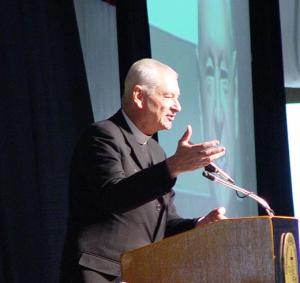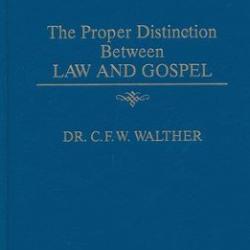
+++
I don’t know which preacher — George Whitefield, John Wesley, or Charles Spurgeon — really said it, but I’ll admit I’m a sucker for the quotation: “set yourself on fire and people will come to watch you burn.” (go ahead, call me a pietist!).
The image of a preacher set on fire by the Holy Ghost, faithfully and vigorously proclaiming the word of God, is the opposite of an image of “institutionalization.”
Even so, as much as Christians know that vital faith is a desirable quality, we always have need for the “slow burn” a fireplace makes possible. Great harvests of souls due to the Spirit’s outpouring are highly desirable, but we also need structure and stability for the people of God.
And even though the churches the Reformation tend not to think this way (invisible church all the way!), the truth is that Christ says His church is a material body — we are a very “grounded” reality. Going right along with this, on this side of heaven the church will always be known as an earthly institution – even as its origins and true life derive from heaven above.
I know this kind of thinking might sound foreign for many Christians, but think about how people talk about something very organic – marriage – as an institution. As a ground of stability given for our good. I think the way that some of the Eastern Orthodox talk about the nature of the church can also be helpful: “not an organization with mystery but a mystery with organization.”
Therefore – we are not to shun the visible nature of the church (more) — nor any of the individuals associated with it! (even as yes, we realize that there are both wheat and tares among us) We should desire the health of the institution – for each individual member of the body of Christ!

All this said, as we all know, the wrong kind of “concern” for the institution and its members can creep in. In other words, the dreaded “institutionalization” often occurs – with good institutions losing touch with their true identity; their true reason for being.
This has happened with the congregations coming out of the 16th century Reformation in spades. In these latter days, the world has, at large, overwhelmed the church.
- Right concerns for matters of social justice have pushed out the more pressing matters of perpetual Gospel proclamation and repentance — as well as loyalty to the family of believers first and foremost.
- For many, churches which once admired or at least took seriously stirring Law and Gospel sermons — “Sinners in the Hands of an Angry God” anyone? — have been reduced to places to find community where “good people” who believe in a general God can “do good.”
- Concerns to nurture and pass on a spirit of passion and vitality have led many to trust the “the Feeling” that can be reliably produced, week by week, in a Big Box Megachurch – while serious proclamation and study of God’s word takes a back seat.
- The assertions of “but Science says…” and “but consider the assured results of higher criticism….” perpetually reintroduce us to the Serpent in the Garden: “Did God really say?”
- A concern to communicate the love and mercy of God have resulted in churches without any real discipline, where grace is cheap and lessons of the past are all but forgotten.
- Serious and passionate books of theology that helped to drive the Reformation – like Martin Luther’s Bondage of the Will – are not deeply studied and/or are totally ignored.
And even very serious believers, seeking to push back against the world, have ended up trying to fight with the world’s weapons.
With church bodies around them dropping on the left and the right – many who do seem to be having some success do their utmost to simply “keep things going.” Hence, their institutions have become a hollow shell of what they once were – and of what they should be. Focused on externals, their mini- and mega-bureaucracies, and ever more worldly concerns (often in the guise of outreach and relevance) their heart, their core, and their true spiritual vitality are being carved out.

Have the letters of Paul – or those written by the Apostle John, to the churches in the book of Revelation — stopped being as relevant as they originally were? But we rarely meditate on this, if we see it… sense it… at all. And do I hear my Facebook and Twitter feed calling me?…
As the hymn says, due to life’s “riches, cares, and pleasures,” we have not taken up (tolle lege!), but rather put down the Scriptures. For the idea that these are the actual Word of God – words more important than anything we could utter today – has been lost. Take, for example, this recent quotation from a pastor reflecting on Reformation:
This year we commemorate half a millennium since this Augustinian friar and Bible professor nailed (or so the story goes) his Ninety-Five Theses to the door of the Castle Church in Wittenberg. The event certainly changed the landscape of Christendom. Its unintended aftershocks, some argue, are still felt in Western culture. Still, the passage of time alone makes it perfectly reasonable to ask: Does Luther have anything to say to us?
Contrary to the assumptions of this pastor, it is by no means perfectly reasonable for us to ask this question. It is only reasonable if you think the “social imaginary” of the postmodern world, a la Charles Taylor — where people fixated on this or that idea of “progress” tell themselves they are on “the right side of history” — is justified at all in its view. But, per Romans 1, that is not a view which can ever be justified: many of the things our wider world says are right it, deep down, knows are wrong. The “social imaginary” (call it a “worldview” if it, being as irrational as it is, can even earn that designation) is just this or that “social illusionary”.

So, again, is it ever reasonable for a pastor to ask the question this pastor asks? Perhaps. It could be if he is simply voicing the common prejudices of the age – ultimately intending to reveal the truth and bring the message of salvation to his hearers… In other words, one is willing to address one’s audience using the kinds of questions that they might be asking, but ideally, they would not be asking.
But even then, here, it seems, there is room to fudge.
For example, the same pastor quoted above gave a talk at an Episcopal Church titled “Justified for Good:What Luther Can Teach Us Today”. Much of the talk I deeply appreciate — the content has true value, highlighting God’s graciousness, and is thought-provoking in its manner of conviction. And yet, around 31:00-33:30 (listening to the whole talk is a good idea) he says:
“I, you, all of us, each and every person, is and remains God’s work… And that means that each and every one of us comes before our own works. Before I have done anything, before I have made anything of myself, before I have done anything with myself, I am already God’s workmanship… Before any accomplishment, or any sins are even taken into account – any accomplishments or any sins – anything that I want to live up to or anything that I want to live down, the sinner, the sinner who stands before God, is already a beloved creature of God. The sinner is, you might say… is already irrevocably recognized by God Himself, and it is God who declares the sinner good, and in good standing… He gives us an identity. He declares that what I am is above all a person that He loves. A child that He loves before I undertake anything, before I make a mess of myself, I already am who I am by God’s justification.”
One might well think: what happens to the very real effect of original sin? Even if there are times that I can or should say that these things are true of those baptized into Christ — and I submit there are — should I say this of the whole world — or, risk giving the impression that this is what I am doing? After all, God’s wrath abides on the world because of sin and unbelief, save the faith connection we have in Christ. The world’s sins have been paid for and all is redeemed in Him. But salvation? That’s why II Corinthians 5:20 follows 5:19 and he urges his hearers to “be reconciled to God!” And note that Paul is even talking to those in the church here!

When I asked this pastor about this, he simply said to me: “No quibble here. It’s an argument from silence.”
But of course my point was not to make an argument – trying to show, I guess, that this pastor did not believe in original sin or something like this. Rather, I am simply pointing out that without clarity about sin, its effects, and its consequences, this kind of message is liable to be completely misunderstood, or even hijacked by those who are ever more eager to see a more “progressive” stance from Christians. Hence my reply:
“My point is that we dare not remain silent — nor give the world a misleading comfort — when there is such a great wrath! There’s a reason we talk about law prior to Gospel and repentance prior to forgiveness, even if this is often abused by many an evangelist (i.e. “There is no need to treat that person kindly prior to them coming to faith”). Maybe I miss your point.”
Another person weighed in, saying simply “UOJ,” suggesting that the doctrine of universal objective justification, explained here, justifies the kind of message this pastor proclaimed.
Oh. So all is well then. Everybody just carry on.
Yes?
No.

As I put it not long ago, we should offer the world no quarter when it comes to our public confidence about what it is we are doing. Our default attitude should be more akin to the following:
“The Bible is the Word of God. Whoever you are, Jesus Christ is your Creator, your God, your King. This is what Christians have always believed and taught. It is only for the sake of conversation and common ground with the world – all of whom we are to love with Christ’s love – that we might start by talking about how the Bible “contains God’s Word”, “contains the Gospel”, how Jesus is “our God,” or how we consider the Bible to be authoritative.”
Do I always act that way? Do I always believe that way? No, of course not. Shame on me. That is a sign for me to repent.
Or, in an effort to appeal to the business mentality of my early 21 century American brethren, an opportunity to repent.
Act now! This may indeed be a limited one time offer!
Come to the feast, brothers! Let’s dig in together, reflect together, pray together…

FIN
P.S.: More in the next post about why we have these problems, and featuring a hard look at the author’s own church body, the Lutheran Church – Missouri Synod. The post will be called The Bondage of Confessional Lutheran Scholarship.












